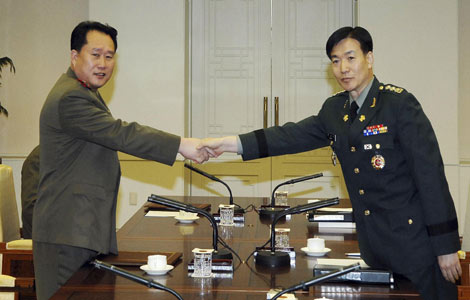Asia
DPRK, ROK colonels meet to ease tensions
Updated: 2011-02-09 09:59
By Qin Jize (China Daily)
|
 DPRK Colonel Ri Son-kwon (left) and his ROK counterpart Moon Sang-gyun pose before their talks at the truce village of Panmunjom in Paju, north of Seoul, on Tuesday. Military officers from the two sides met at their heavily fortified border for the first inter-Korean talks since tension peaked on the peninsula late last year. [Photo/Agencies] |
The working-level military talks, which started at around 10 am on the ROK side of the demilitarized zone, were meant to lay the groundwork for a subsequent meeting between Seoul and Pyongyang's defense ministers, the first in more than three years.
The meeting marks a rapid cooling of tensions between the DPRK and the ROK following Pyongyang's offer of unconditional talks to Seoul in January.
A spokesman for the ROK Defense Ministry reiterated Seoul's stance that ministerial talks can only take place if the DPRK apologizes for the Yeonpyeong incident and the sinking of the ROK's Cheonan warship last March.
Chinese experts expressed cautious optimism over the latest developments
Following last year's elevated tensions, "it is better to have some dialogue than none", said Jin Canrong, deputy director of the School of International Studies at Renmin University of China.
But he cautioned against high expectations from the dialogue, as Seoul has said Pyongyang must take responsibility for the two incidents.
"There is no change in their positions since the last time and the conditions that the ROK has set before the negotiations are a barrier to a productive outcome. We may wait to see if the two sides manage to find a way to shelve certain disputes to allow ministerial-level talks to take place," he said.
Liu Jiangyong, a professor at Tsinghua University, said China's shuttle diplomacy and Washington's positive influence on the ROK government had played important roles in getting the two sides back to the negotiation table," he said.
However, as the meeting was a low-level one "about talks" between the two militaries, the "possibilities are that they may end unproductively", he said.
However, a successful DPRK-ROK dialogue is the necessary precursor to restarting the stalled Six-Party Talks on the Korean peninsula nuclear issue, he added.
The ROK Defense Ministry gave no further details about Tuesday's meeting, although analysts based in Seoul earlier predicted that Pyongyang would do its best to ensure the talks entered a second round.
"Pyongyang will try hard to pass through this preliminary stage to achieve higher-level talks," Choi Jin-wook, a senior researcher at the Korea Institute for National Unification, told the Korea Times.
In another development, Wi Sung-lac, the ROK's chief negotiator to the Six-Party Talks, will visit China later this week to discuss the DPRK's claimed uranium enrichment program.
He will meet his Chinese counterpart Wu Dawei on Thursday and other Chinese senior diplomats to brief them on the results of Tuesday's DPRK-ROK military talks.
The visit comes prior to the forthcoming regular meeting of a UN Security Council committee tasked with overseeing sanctions on the DPRK, slated for Feb 23.
The ROK has been seeking to refer the case to the UN Security Council, claiming the newly acknowledged program runs counter to its international obligations.
Shinsuke Sugiyama, Japan's new chief delegate to the Six-Party Talks, came to Beijing and held talks with his Chinese counterpart Wu Dawei at the end of last month, days after the United States Deputy Secretary of State James Steinberg's Beijing visit.
Ma Liyao and agencies contributed to this story.
E-paper

Ear We Go
China and the world set to embrace the merciful, peaceful year of rabbit
Preview of the coming issue
Carrefour finds the going tough in China
Maid to Order
Specials

Mysteries written in blood
Historical records and Caucasian features of locals suggest link with Roman Empire.

Winning Charm
Coastal Yantai banks on little things that matter to grow

New rules to hit property market
The State Council launched a new round of measures to rein in property prices.





